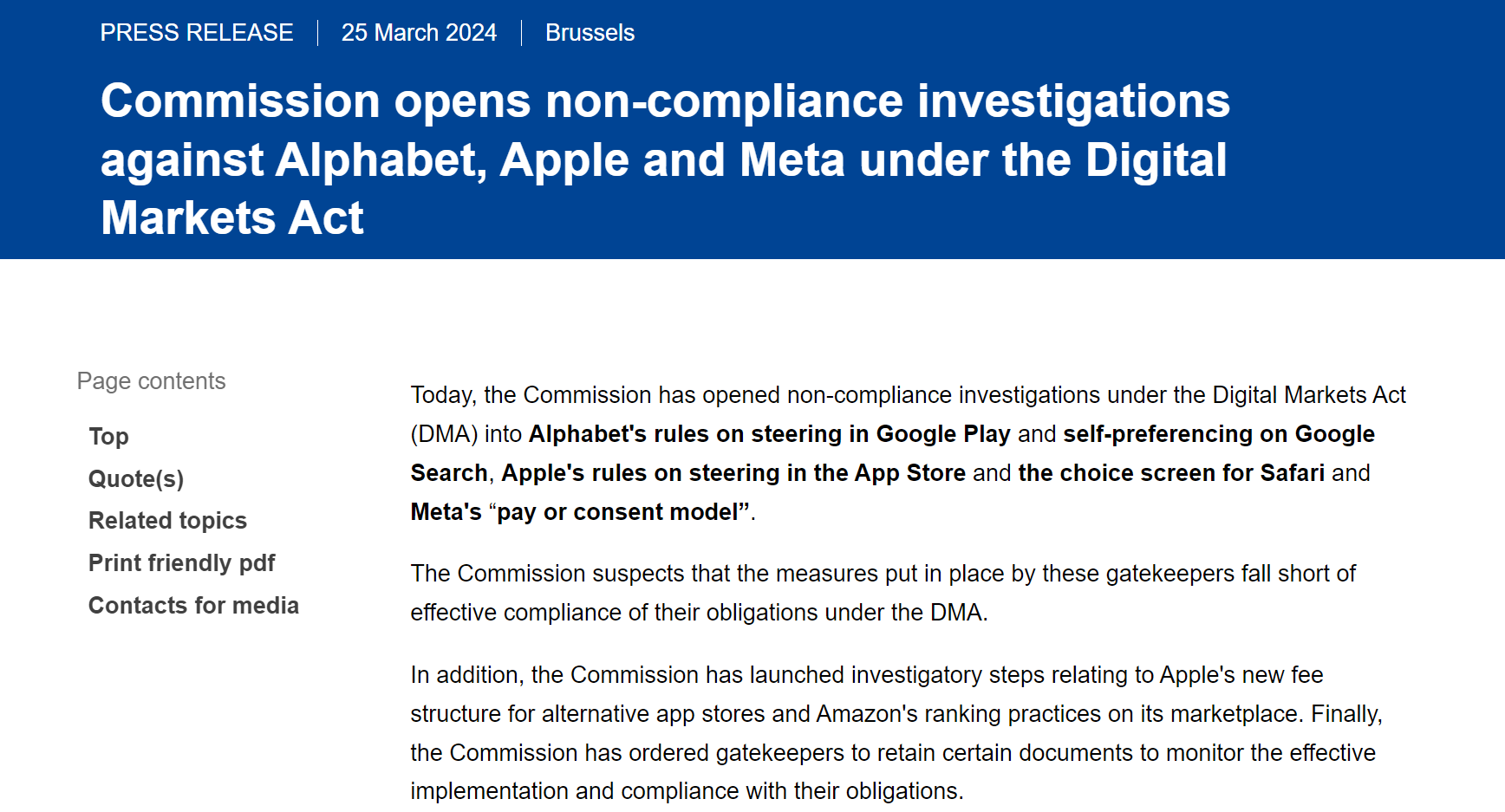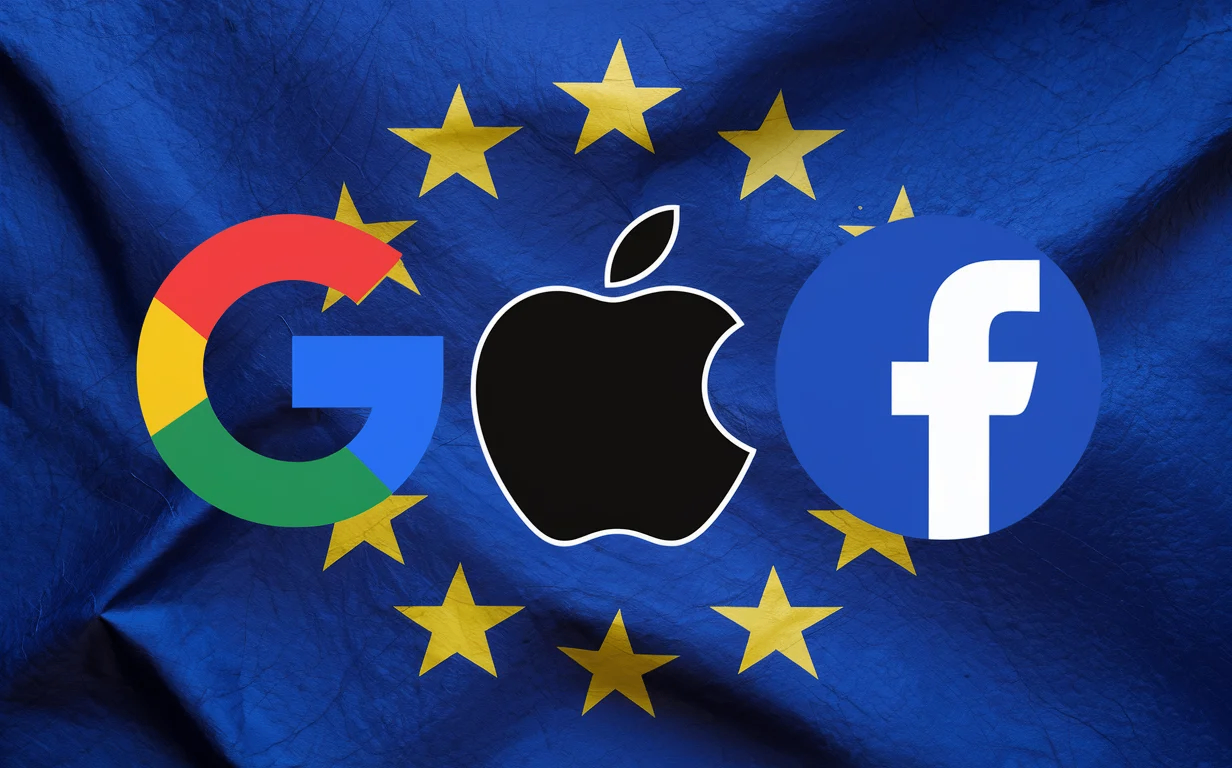EU Digital Market Act "bright sword"! Apple, Google and Meta are the first targets of the survey
The European Union has stated that it has launched a comprehensive investigation into Apple, Google, and Meta's compliance with the Digital Markets Act (DMA).
On March 25th, the European Union announced that it has launched a comprehensive investigation into Apple, Google, and Meta's compliance with the Digital Markets Act (DMA).
In a press release, the European Commission wrote: "Today, the commission conducted an investigation based on DMA's redirect rules for Alphabet in Google Play and Google Search, Apple's redirect rules in the App Store, Safari's' browser selection screen ', and Meta's' pay or agree mode'."

The committee suspects that the measures taken by these "gatekeepers" have not effectively fulfilled their obligations under DMA regulations.
The so-called "gatekeepers" refer to the parent company of Google, Alphabet, Amazon, Apple, ByteDance, Meta and Microsoft. They are the six "gatekeepers" designated by the committee in September 2023, and the committee requires them to fully comply with all DMA obligations by March 7, 2024.
For Alphabet, the European Commission stated that it has initiated a process to evaluate whether the measures implemented by Alphabet regarding its App Store obligations violate DMA. Article 5 (4) of DMA requires "gatekeepers" to allow application developers to "guide" consumers to use products outside of the gatekeeper application store for free.
The committee also stated that it has filed a lawsuit against the company and has determined whether Google search results may lead to self preferences of Google vertical search services (such as Google Shopping, Google Flights, Google Hotels) relative to similar competitor services.
In response, Alphabet stated, "In order to comply with the Digital Markets Act, we have made significant changes to the way we operate our services in Europe. Over the past year, we have participated in dozens of events with the European Commission, stakeholders, and third parties to receive and respond to feedback, and balance conflicting needs in the ecosystem. In the coming months, we will continue to defend our approach."
For Apple, the committee has also initiated a program to evaluate whether the measures implemented by Apple regarding its App Store obligations violate DMA.
In addition, the committee stated that it has filed a lawsuit against Apple, requiring it to take measures to comply with the following obligations: (i) enable end users to easily uninstall any software applications on iOS, (ii) easily change default settings on iOS, and (iii) prompt users with "browser selection screens" that must be effective and easily allow them to choose alternative default services, such as the browser or search engine on the iPhone.
Apple responded, "We believe our plan complies with DMA regulations and will continue to maintain constructive engagement with the European Commission during its investigation. Apple's various teams have created a series of new developer features, features, and tools to comply with the requirements of the regulation. At the same time, we have also introduced protective measures to help reduce the new risks faced by EU users' privacy, quality, and security experiences. Throughout, we have demonstrated flexibility and responsiveness to the European Commission and developers, listening to and adopting their feedback."
The European Commission has stated that it is investigating whether Meta's "payment or consent model" complies with Article 5 (2) of DMA, which requires "gatekeepers" to obtain user consent before intending to merge or cross use user personal data in different core platform services.
Meta responded by stating that subscription as a substitute for advertising is a widely recognized business model in many industries, and we have designed "ad free subscription" to address several overlapping regulatory obligations, including DMA. We will continue to maintain constructive contact with the committeeIt is worth noting that the committee has granted Meta an additional six months to fulfill DMA's interoperability obligations with Facebook Messenger.

In addition, the committee has initiated investigation steps regarding Apple's new fee structure as an alternative to the App Store and Amazon's ranking practices in its market.
Amazon has also issued a statement regarding the actions of the European Commission: "Amazon complies with DMA, and since designating two services, Amazon has been in constructive contact with the European Commission regarding our plans. We continue to work hard every day to meet the high standards of all customers in Europe's constantly changing regulatory environment."
Finally, the committee also passed five retention orders targeting Alphabet, Amazon, Apple, Meta, and Microsoft, requiring them to retain documents that can be used to evaluate their compliance with DMA obligations, in order to retain existing evidence and ensure effective implementation. That is to say, among the six "gatekeepers", only ByteDance has not faced the EU's investigation.
The European Commission has stated its intention to end the litigation proceedings initiated today within 12 months.
If, after investigation, it is found that the above-mentioned company has engaged in infringement, the committee may impose a fine of up to 10% of the company's global total revenue on the relevant company. If repeatedly infringing, the maximum fine can reach 20% of its global total revenue. In addition, in the event of systematic violations, the committee may take additional remedial measures, such as requiring "gatekeepers" to sell business or part of the business, or prohibiting "gatekeepers" from obtaining additional services related to systematic violations.
Thierry Breton, the internal market specialist within the committee, said, "For several months, we have been discussing with gatekeepers to help them adapt, and we can already see that the market has changed. However, we do not believe that Alphabet, Apple, and Meta's solutions fulfill their obligation to provide a fairer and more open digital space for European citizens and businesses. If our investigation concludes that they have not fully complied with DMA regulations, gatekeepers may face significant fines."
·Original
Disclaimer: The views in this article are from the original Creator and do not represent the views or position of Hawk Insight. The content of the article is for reference, communication and learning only, and does not constitute investment advice. If it involves copyright issues, please contact us for deletion.